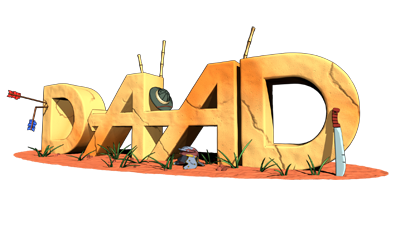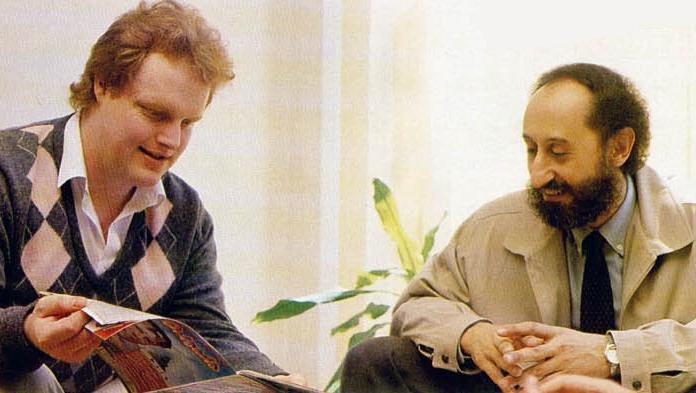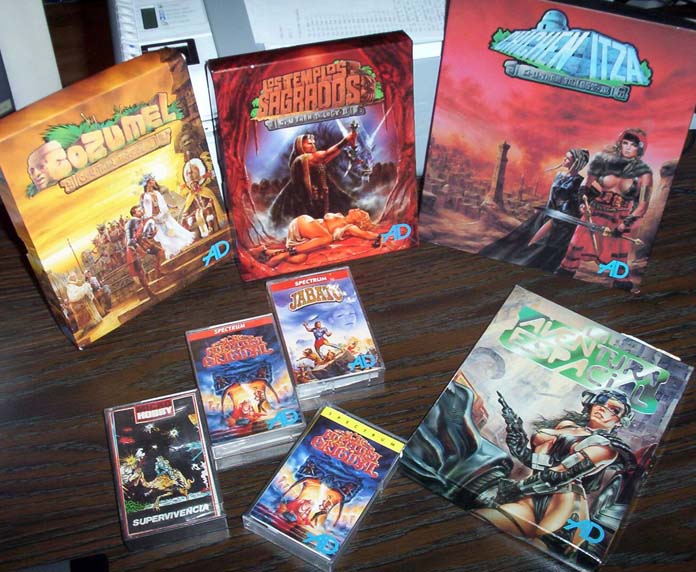-
Notifications
You must be signed in to change notification settings - Fork 3
MSX2DAAD Wiki: About DAAD
Main article in spanish from CAAD Wiki website .
The DAAD, acronym for "AD Adventure Designer" ("Diseñador de Aventuras AD" in spanish), was the authoring system used by Aventuras AD to create their conversational adventures. The system was based on SWAN ("System Without a Name"), which in turn was an evolution of the PAWS that was sold commercially by Gilsoft.

| Field | Data |
|---|---|
| Title: | DAAD (Diseñador de Aventuras AD) |
| Author: | Tim Gilberts |
| Creation date: | 1988 |
| Publisher: | Aventuras AD |
| Plataformas: | Spectrum, Amstrad CPC, Commodore 64, MSX, Commodore Amiga, Amstrad PCW, Atari ST, MS-DOS |
| Latest version: | 2.8 |
| Price: | Sold exclusively to Aventuras AD for more than 2,500,000 pts (~15.000€). Subsequently, the AD itself put it up for sale for 1,000,000 pts without finding a buyer. |
The same Tim Gilberts, author of the PAWS, was responsible for its development after a visit by Andrés Samudio (director of Aventuras AD) to Wales, where the headquarters of Gilsoft was located.
The DAAD allowed the conversion of the adventures to the different computer models existing in the market. This is how Gilberts was hired by Aventuras AD during the following year to develop the programming tool and teach the AD team to handle it.
The price of DAAD was more than two and a half million pesetas, according to Samudio himself, and thanks to him the AD team expected to publish an average of ten adventures each year.

The DAAD allowed to easily versioning the game to different systems. Thanks to this, Aventuras AD was one of the companies that published the most different versions of its games, especially in less widespread systems in Spain such as Atari ST, Commodore Amiga, Commodore 64 or MSX.
In general, the games were programmed under MS-DOS , the graphics developed in Atari ST for the 16-bit versions (so they lost quality when transferred to PC, due to the lower color palette of the origin pictures, although the Amiga version was identical to that of Atari ST), and in Spectrum for the 8-bit versions, which were later retouched taking advantage of the characteristics of each computer.
Another remarkable feature with respect to its predecessors was the object treatment system, where the programmer chose an object and defined all its characteristics (it is solid or liquid, hard or soft, poisonous or not, etc). Automatically, the program treated it as such. This allowed once to define the object that behaves exactly as it has been designed, allowing all kinds of manipulations, provided it had been designed for them.
As for the characters, he also allowed their attributes to be defined and then handled them in accordance with that definition.
Main article: MicroHobby adventure contest
In the summer of 1989 Aventures AD and the Spanish magazine MicroHobby convened a nationwide adventure programming contest that received more than 100 entries.
In principle, the prize for the single winner consisted of 200,000 pts in cash, the publication of the adventurous adventure by Aventuras AD and several trips to England, Madrid and Valencia to learn about the mythical places of adventure creation.
However, the contest faced several problems (such a high participation, Aventuras AD crisis, and 8-bit computers, etc.) were not expected, so it was finally decided not to grant the initial prize to a single winner , but to offer seven semifinalists a shared prize (with the acceptance of all the finalists) consisting of making the DAAD available to them, in addition to a one-week stay in Valencia for each winner in order to teach them how the program works. Finally Aventuras AD also offered to put in the hands of the main commercial houses the new works carried out by the winners of the contest to facilitate them to achieve their commercialization. All the finalists accepted the agreement and received their copy of the DAAD,
The company's initial plans to publish up to ten adventures per year were far from reality. In its five years of existence Aventuras AD only produced six adventures plus one promotion. The develop price of DAAD was a constant burden on the company.
In some adventures payments were delayed, causing several programmers to leave the company. Even the last adventure did not get paid by Dinamic.
Finally, after speculating on the possibility of reselling the DAAD for a million pesetas without being achieved, Aventuras AD finally abandoned the production of adventures in 1993.
The games made with this parser were the following:
| Year | Title |
|---|---|
| 1989 | La Aventura Original (The Original Adventure) |
| 1989 | Jabato |
| 1990 | Cozumel |
| 1990 | La Aventura Espacial (Space Adventure) |
| 1991 | Los Templos Sagrados (The Sacred Temples) |
| 1992 | Chichen Itza |

After the closing of Adventuras AD, about 20 years passed without knowing anything about the program, since the only surviving copies were, in principle, those of the winners of the contest, and those that could be found, had irretrievably damaged records. These attempts were made by Carlos Sanchez "Uto" and others.
Unexpectedly, among the material provided by Andrés Samudio to the Association of Users of Classical Computing (AUIC) to exhibit at the Madrid Games Week 2013 event, some records appeared, stored in his storage room for years, with most of the system conserved and in functional status (excepts C64 binaries and some others), from which the DAAD could be almost fully recovered and made available to the public interested in its use or study after obtaining the author's express permission during the Valencia Va de Retro 2014 event.
You can read more about this first recovery history at blog "Linea Dura" (spanish).
The disks recovery task was realized by Pedro Fernández, Jaime Soriano (aka "alt"), Javier Chocano (aka "Habi"), and Samudio himself.
Some years later, starting 2017, Stefan Vogt did some collaboration projects with Tim Gilberts, and in 2018 they decided to complete the missing parts of DAAD, including the english interpreters and the sources templates, because most of the programs rescued in 2014 were just the spanish versions.
They finally complete the system again and recover everything that was missing, even fixing old bugs and put new interpreters out.
The Atari ST, C64 and PCW interpreters (both spanish and english versions) were recompiled and added to the interpreters that was found at Samudio's disks.
All this work was supported by Pedro Fernández, which helped with all his knowledge acquired about DAAD since the first recovery.
You can read more about this last DAAD recovery at the Classic Adventurer article "Raiders of the Lost Parser" (english).